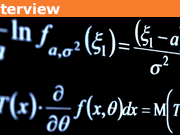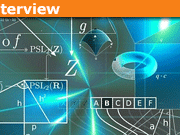Interview with Physics Mentor: Stevendaryl
Give us a brief history on stevendaryl
I was born and raised in the American South, mostly living in Georgia. It’s a Southern tradition, for some reason, for kids to be called by their middle name, so my friends call me “Daryl” even though my first name is “Steven”.
I grew up in a family of 6 and following the tradition, I am married and the father of 4 children. All 4 are adopted and all just about grown up now. We’re a Panda family–black, white and Asian.
Where did you go for university and what was your education experience like?
I went to college at Northwestern University, near Chicago, where I got to experience real winter for the first time. At Northwestern, I was one of a small number (less than 30) of students enrolled in a new interdisciplinary science program, called ISP (Integrated Science Program). We learned a little bit about just about everything: Mathematics, physics, geophysics, astrophysics, meteorology, chemistry, biology, a little computer science (way back then, that meant programming in Basic or Fortran).
I very much loved going to Northwestern, and being among people who were passionate about science (and other nerdy things like computers and Dungeons and Dragons). I always went to the NU football games, even though I don’t think they won a single game in the years I went there. (They’ve gotten better recently.)
Being a Southerner living in the Chicago area, I discovered (besides winter) bagels and yogurt, which we never ate in Georgia.
I went to graduate school in physics at Iowa State University, but I only earned an ABD (All But Dissertation). I dropped out before getting a PhD for personal reasons, and moved to Ithaca, New York State, where I worked in computer science, which I’ve been doing ever since.
What parts of your physics education/training were difficult and how did you overcome them?
I guess the two hardest topics for me in physics were Quantum Field Theory and General Relativity. In both cases, it wasn’t so much the conceptual difficulty, but the enormous amount of mathematics needed to do actual problems: Learning to manipulate tensors and covariant derivatives and Christoffel symbols (for GR). Learning to manipulate spinors and Dirac gamma matrices, and learning about traces and determinants and the Dirac “slash” notation, calculating using Feynman diagrams, putting regulators into integrals, etc. In both cases, it seemed like an enormous amount of machinery and notation that had to be learned.
In the case of General Relativity, I studied on my own after leaving grad school. I plowed through Misner, Thorne and Wheeler’s “Gravitation” at a glacial pace (it took me several years–I can’t say that I’m actually done with it now). The internet of course proved enormously helpful, because I could find FAQs and discussion groups (Usenet, at first, and later this forum) that went over the topics.
In the case of working with QFT, I confess that I haven’t done much with it since grad school, and I am not very competent at doing any real calculations in it anymore (if I ever was).
What got you interested in physics and specifically quantum mechanics?
Einstein is who got me interested in physics. I mean, he was already dead before I was born, but I was fascinated by him, and the weirdness of Special Relativity and his reputation as being the smartest man in history (which wasn’t true, probably, but that’s what I thought). I learned Special Relativity on my own (even before learning any Newtonian physics) when I was maybe 14 or so.
Quantum mechanics took a lot longer to catch my imagination. I learned it as an undergraduate, and it was just another technical topic, like learning calculus or differential equations–you learned to solve the Schrodinger equation or the Dirac equation. My professors did not give me any hint that there was anything strange about quantum mechanics. Its strangeness crept on me gradually. I started reading pop-science books about it (I’m embarrassed to say which ones, but in a spirit of openness, I’ll mention a few:
“The Dancing Wu Li Masters” by Gary Zukov
“The Tao of Physics” by Fritjof Capra
“What is Life?” and “Mind and Matter” by Erwin Schrodinger (not embarassed about this one, but it’s rarely read. Two long essays on physics and biology by one of the founders of quantum mechanics)
“Speakable and Unspeakable in Quantum Mechanics” by J. S. Bell
What topics in quantum mechanics are you most interested in and what research are you most looking forward to?
As I said, my life path took me away from physics and into computer science, so I don’t actually do research except for fun. The topics that I have enjoyed most have been those that touched on the foundations of physics, such as decoherence, the many-worlds interpretation, the Bohm interpretation, Bell’s theorem, etc.
Tell us a bit about what you do for work and how your daily work life goes
I am a computer programmer (even though people tell me that that description is old-fashioned, that people are called “coders” these days, and they don’t write programs, they write “aps”). I have worked in computer security, in computational linguistics, in computer-supported theorem-proving, in distributed systems and web programming. Right now, I’m a contract programmer, doing work in Java, R, python, Visual Basic, javascript or whatever the client needs, pretty much. I work remotely from home, which is dangerous because of all the distractions of the piano, Facebook, Physics Forums and my refrigerator.
If you could solve one question in physics what would it be and why?
I’m going to break the rules and mention two.
Well, I would most interested in figuring a satisfactory (for me–I think it’s subjective what would be considered satisfactory) answer to a number of puzzles that have bothered me for years. One is that I don’t yet feel like I understand how measurement works in quantum mechanics. A second one is the arrow of time, which is the issue of why the early universe was so low in entropy (compared to what it could have been). These are two problems that have been tackled for years by people much smarter than me, so I don’t expect to solve either one, but they are the ones that I am most interested in knowing the answer to.
Is there a recent development in science/tech that excites you?
I suppose that the potential of nanotechnology is the most exciting to me. I don’t have a good feel for what are its limits, but the idea of having functioning machines that are as small as a human cell seems like science fiction come to life.
How did you happen upon Physics Forums and why is it important to you?
I actually don’t remember how I came upon Physics Forums. I’ve been involved in physics discussions for forever, but for many years, it was on Usenet (the groups sci.physics, sci.physics.relativity, sci.physics.research). I met and became somewhat friends with many interesting people on Usenet, including some who went on to become somewhat famous (I had frequent discussions with John Baez, for example). But at some point, the quality of usenet started deteriorating. There were too many cranks and crackpots, and a lot of the more knowledgeable participants drifted away.
So I was pleasantly surprised to find Physics Forums, where high quality discussions can take place, and where they do such a good job of cleaning up crackpot and spam posts (which is what ruined Usenet for many people).
What are some of your favorite movies, music and foods?
Let’s see. My favorite all-time movie has to be “Groundhog Day”. I can watch that over and over again. (If you’ve seen, you’ll know the significance of that praise.) I like a lot of science fiction, although I often find myself disappointed out how lightweight the blockbusters are, when it comes to ideas. My favorite nov.elist (I know that wasn’t the question, but anyway) is Philip K. Dick, and I always watch any movie that is adapted from one of this stories (Blade Runner, A Scanner Darkly, Minority Report, Total Recall, and the Amazon series The Man in the High Castle).
For music–the Beatles are my all-time favorite pop group, and I like most of the big classic rock groups, as well as Radiohead, Neil Young, Kate Bush, Lucinda Williams, The Shins. I’m not sure what theme ties all those together. In non-pop music, I like Bach and Chopin and Stravinsky and Scott Joplin (which I guess was pop 100 years ago).
Food: I like Jewish food (even though I’m not Jewish) like latkes and rugelach. I like middle eastern food (falafels, baba ganoush, stuffed grape leaves). I like Indian food and Mexican food and Thai food. And as a Southerner, I also like cornbread, iced tea, watermelon, fried chicken, fried okra, (just about anything breaded and fried).
I have a BS in Information Sciences from UW-Milwaukee. I’ve helped manage Physics Forums for over 22 years. I enjoy learning and discussing new scientific developments. STEM communication and policy are big interests as well. Currently a Sr. SEO Specialist at Shopify and writer at importsem.com








I have also read “The Tao of Physics” by Fritjof Capra, when I was in my teens and because I for some reason was interested in taoism. I can't remember anything from it. And it's not in my bookshelf anymore, it went to a charity second hand store when I optimized my book collection :biggrin:. I have to add that it is not the most embarassing book I have read in the folly of my youth… :blushing: …that book won't be mentioned here…
Really liked your history. Wow. A Wildcat!!! What years were you at Northwestern? Some of my classmates from college went there for graduate school. The campus and the nearness to Chicago are very nice.
Groundhog day is also one of my favorites.
I too read “The Dancing Wu Li Masters” by Gary Zukov and “The Tao of Physics” by Fritjof Capra. I remember being somewhat disappointed.Reference https://www.physicsforums.com/insights/interview-physics-mentor-stevendaryl/I much preferred reading physics textbooks.
I enjoyed the "anything breaded and fried" comment! I live in the south too, and not coincidentally a decent amount of my research involves liver fat measurement. We call the condition "bojangleosis"
I haven’t had much jewish food, but after looking at images of latkes and rugelach my stomach is rumbling!